Being active helps with neck pain - and having little time due to your job is no excuse. Because you can also combat neck pain in the office and after work with short, targeted exercises. We show you four exercises that you can do easily and without a lot of equipment.
Neck pain is unpleasant and not at all uncommon. Many adults are familiar with this tension, whether in everyday life or in the office. It is often not limited to the neck area, but quickly radiates to the shoulders and head. The pain can be chronic or acute. In any case, it should disappear quickly. Is there no good miracle cure for this? Yes, there is, because even simple exercises can relieve neck pain.
Exercise helps with neck pain
As is so often the case with neck pain: movement helps. And we don't just say that because we as physiotherapists love, live and teach movement. No, as scientists we familiarise ourselves deeply with the topic and research actually provides us with important evidence that we can work with - also when it comes to neck pain.
We now know that there is not just one perfect exercise for neck pain. Current findings show that a wide variety of physical exercises and training concepts can lead to less pain in the neck area (1). From yoga and Pilates to motor control exercises, tai chi and stretching through to strength training, everything is included. In the colourful bouquet of exercise flowers, no one form is actually more suitable or superior than another. The decisive factor is that there is an incentive to move at all. That helps immensely.
Pain despite training?
One-sided exercises in just one area in particular can cause discomfort even with regular training. Does this lack of variety in your training programme apply to you? Then it certainly helps to change your focus from time to time and incorporate exercises that you are not yet comfortable with.
One example:
Yoga is on the programme three times a week. This may be supplemented by stretches that also focus on neck pain. There's nothing wrong with that in itself. However, if neck pain continues to occur, it would make sense to include strength exercises or motor control exercises for the neck. Each individual must find the right rhythm to reduce discomfort.
Four neck exercises for the workplace
What if the pain in the neck occurs acutely, for example at the office? Fortunately, not only chronic neck pain, but also acute neck pain can be improved with exercise therapy (2). That's why we have selected four effective and proven exercises (3) (4) (5) (6) that you can easily do at your workplace or at home after work - without much effort or equipment. The various exercises provide a balance between motor control, strength and stretching.
Chin In on the wall:
What is that good for?
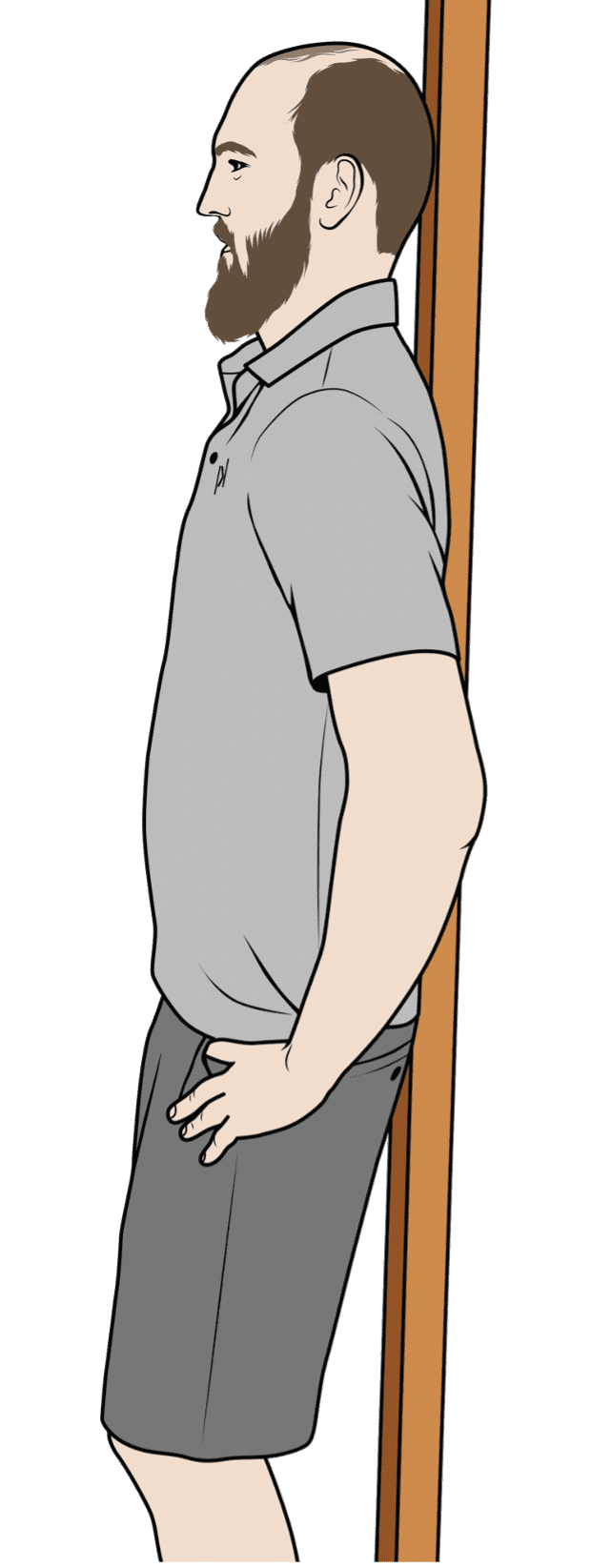
What is that good for?
- Activate neck muscles
- Simultaneously lunge the spine = straighten up
Equipment:
none
Procedure:
- Starting position: lean your head, shoulders, hands and pelvis against the wall
- If you cannot place your head against the wall, a towel can help: Fold it as far as necessary to make contact with your head and the wall
- In the starting position, the chin can point slightly upwards in a relaxed position
- Now pull the chin towards the neck (larynx) = Chin in
- Hold this position for 5-10 seconds before releasing the tension again and allowing your chin to move forwards and upwards.
- During the exercise you should feel a pulling sensation in the neck and spine.
5- 10 repetitions
1-3 sentences
Up to 5 times a day
Rotational expansion on the wall:
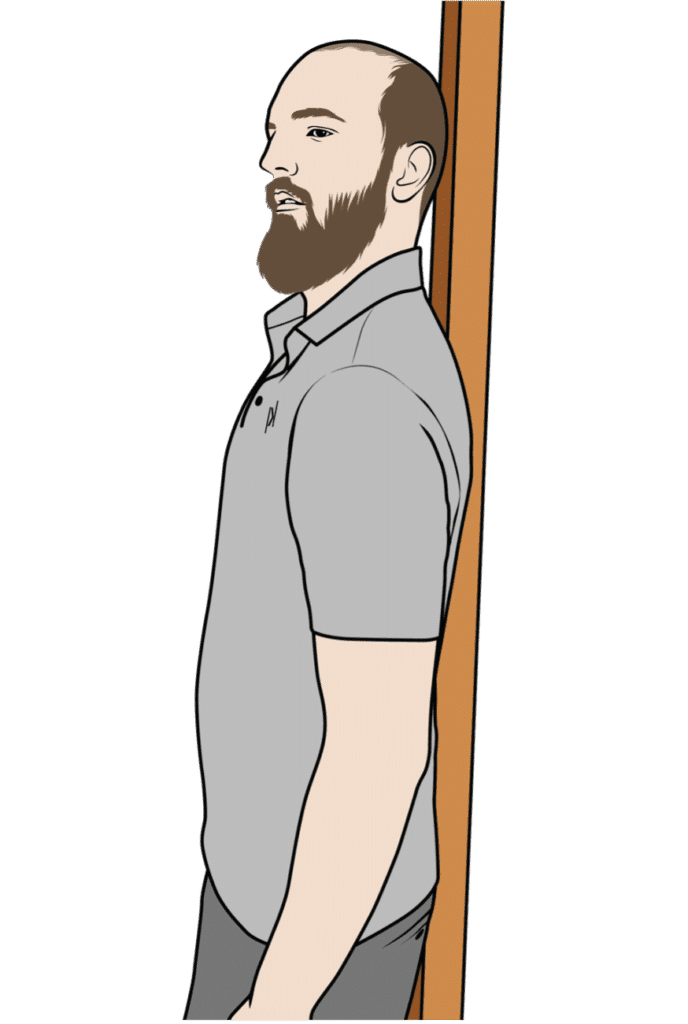
What is that good for?
- Extension of movement and stretching
Equipment:
none
Procedure:
- Starting position: back of head and shoulders are in contact with the wall
- Now turn the head to one side as far as possible until the end of the movement is reached.
- Hold for 30-60 seconds
- Then change page
Each side can be stretched 1-3 times and the exercises can be performed daily. But at least three sessions per week. If sore muscles occur, rest for 1-2 days
Abduction against resistance band:
What is that good for?
- Strengthening the shoulder neck muscles
Equipment:
Dumbbells, resistance bands or even filled water bottles
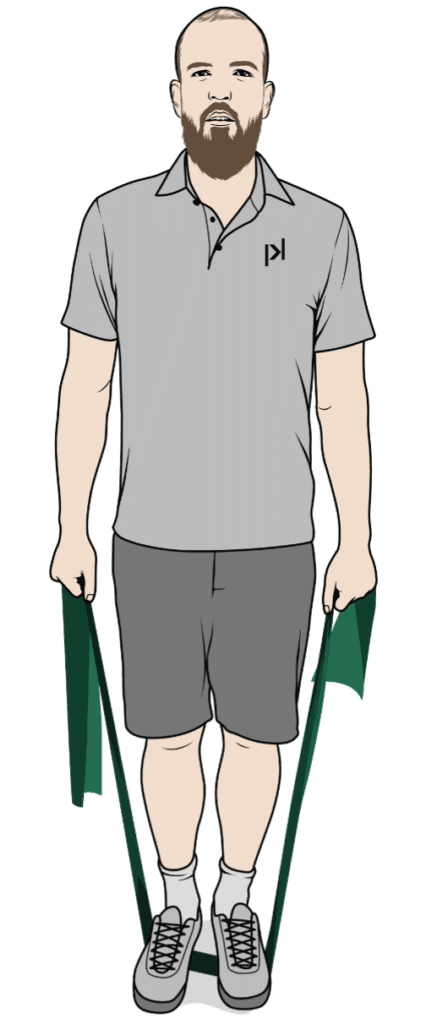
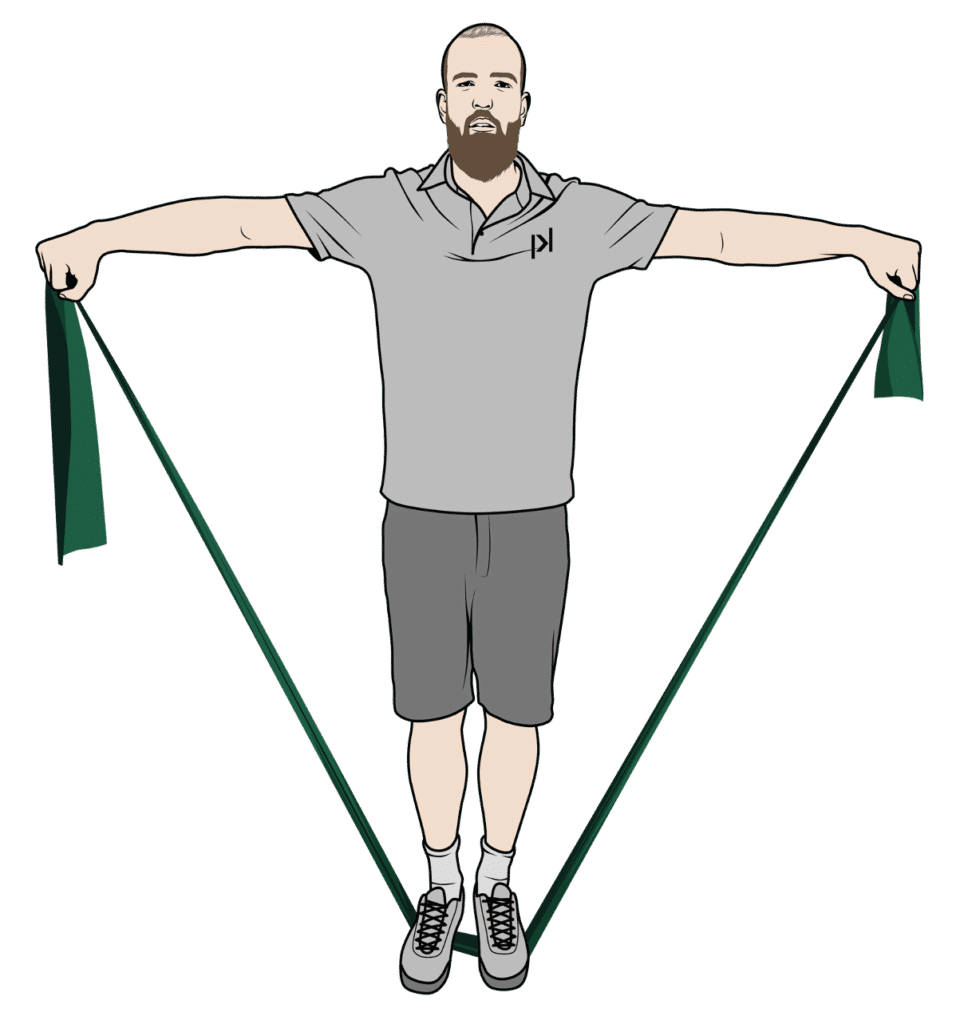
Procedure:
- Starting position: Stand upright with hands hanging loosely at the sides of the body.
- The hands enclose dumbbells or the resistance band. Water bottles also work.
- If you are using a band: There should already be a slight tension on the strap in the starting position
- Now raise your arms sideways, keeping them straight.
- Raise your hands between 70 and 120°, depending on the intensity of the load: do not do this too quickly or too slowly: the highest possible position should be reached in about two seconds.
- Then slowly lower your arms (again in two seconds) to the starting position
By the way: The speed in seconds at which the arms are raised/held at the end position/and lowered is called "Cadence". The cadence for this exercise is: 2/0/2 - Raise your arms for two seconds, do not pause and lower your arms for two seconds
8-40 repetitions (until exhaustion, you should hardly be able to do another repetition in each set)
2-3 sets
Chin In supine position with head raised:
What is that good for?
- Strengthening the neck muscles
Equipment:
possibly a mat
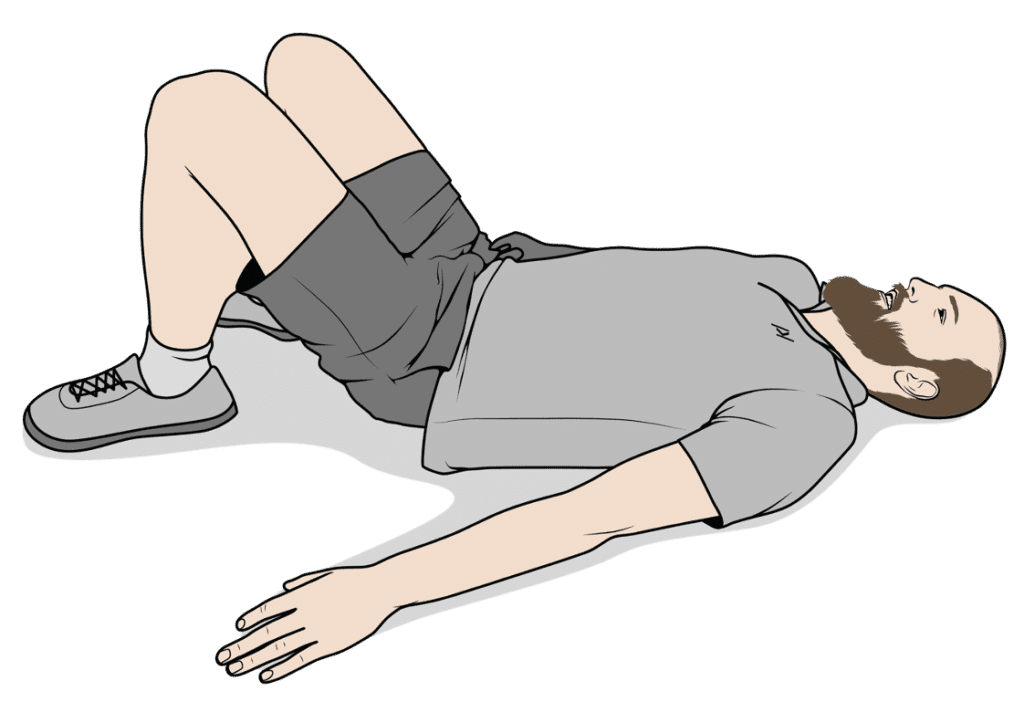
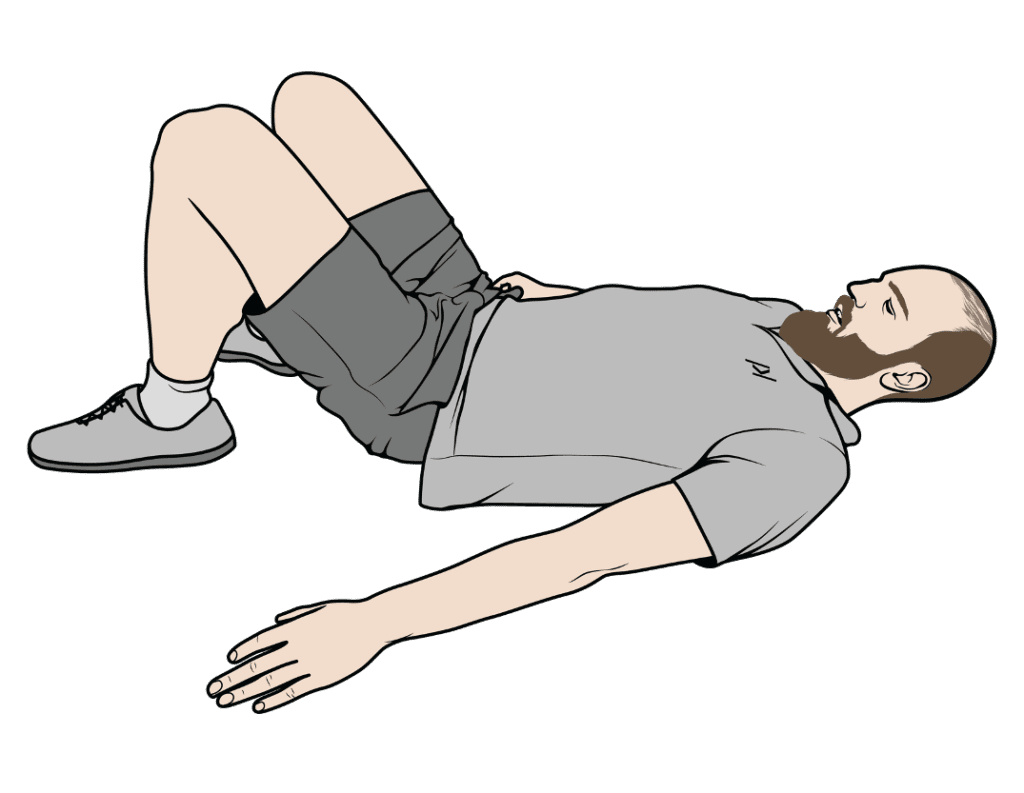
Procedure:
- Starting position: Lie on your back on the floor, rest your head on the floor (a mat can help)
- Now pull your chin towards your larynx (imagine you want to cover your larynx with your chin).
- Then open your mouth slightly and lift your head in the held position.
- Roll your head in as far as possible and then slowly return to the starting position.
- To avoid making the exercise too intense at the beginning, put your head down for a second until the next repetition starts.
- Cadence: 2-4 /0/2-4 and 1 second off (cadence: explanation can be found in the previous exercise)
8-15 repetitions
2-3 sets per training
Sources:
1 De Zoete RMJ, Armfield NR, McAuley JH, Chen K, Sterling M. Comparative effectiveness of physical exercise interventions for chronic non-specific neck pain: A systematic review with network meta-analysis of 40 randomised controlled trials. Br J Sports Med. 2021;55(13):730-42.
https://pubmed.ncbi.nlm.nih.gov/33139256/
2 Louw S, Makwela S, Manas L, Meyer L, Terblanche D, Brink Y. Effectiveness of exercise in office workers with neck pain: A systematic review and meta-analysis. South African J Physiother. 2017;73(1):1-11.
https://pubmed.ncbi.nlm.nih.gov/30135909/
3 Andersen LL, Jørgensen MB, Blangsted AK, Pedersen MT, Hansen EA, Sjøgaard G. A randomised controlled intervention trial to relieve and prevent neck/shoulder pain. Med Sci Sports Exerc. 2008;40(6):983-90.
https://pubmed.ncbi.nlm.nih.gov/18461010/
4 Beneka A, Malliou P, Gioftsidou A. Neck pain and office workers: An exercise programme for the workplace. ACSM's Heal Fit J. 2014;18(3):18-24.
5 Borisut S, Vongsirinavarat M, Vachalathiti R, Sakulsriprasert P. Effects of strength and endurance training of superficial and deep neck muscles on muscle activities and pain levels of females with chronic neck pain. J Phys Ther Sci. 2013;25(9):1157-62.
https://pubmed.ncbi.nlm.nih.gov/24259936/
6 Ylinen J, Häkkinen A, Nykänen M, Kautiainen H, Takala EP. Neck muscle training in the treatment of chronic neck pain: A three-year follow-up study. Eura Medicophys. 2007;43(2):161-9.

